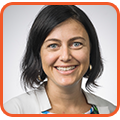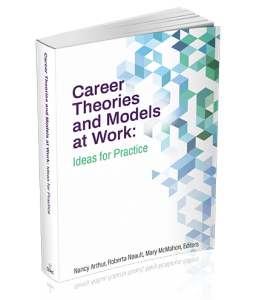This free webinar series offer the opportunity to further explore the career theories and models compiled in CERIC’s book Career Theories and Models at Work: Ideas for Practice. Webinars are led by the contributing authors to the book. More webinars (English and French) presented by the authors of the book will be added to the series soon!
Webinar: Helping Clients Take Control of Their Career Future with the Solution-Focused Theory
Date: Monday, March 29, 2021, 4:00 pm – 5:00 pm ET
Presenter : Judi Miller
Language: English
Overview
The Solution-Focused theory requires practitioners to shift their energy from interpreting what it is that the client wants, to enabling the client to tell, hear and enact their own preferred life-career. Their conversations help clients shape and consider what kind of life they hope for, and to recognize what resources they already have that will help them move towards that desired future. This Solution-Focused theory and approach aims to encourage client curiosity that leads to their (re)discovery of self resourcefulness.
Why You Should Attend:
In the free webinar, Judi Miller will share her experience of working from a solution-focused perspective and encourage participants to explore and reflect on ways that they may incorporate key assumptions and techniques in their work. It is of value to anyone interested in extending the ways that they can collaborate with clients who are exploring their career and work aspirations.
Webinar Learnings:
- Major assumptions and tenets of the Solution-Focused approach to help clients help themselves
- Accepting the challenge presented by viewing clients as experts in their own lives
- Key questions that help clients envisage their hopes for, and beyond, a career counselling session
- Nuanced differences in the Solution-Focused way of listening for the person’s strengths, skills and abilities and for what they are doing now that fits well with their hopes for how they would like things to be
- Practice points for being solution-focused in your career counselling

Webinaire : Advocacie et projet collectif et communautaires menés par des personnes immigrantes : une entrée par la théorie culturelle-historique de l’activité
Date : Lundi 12 avril 2021, 12 h – 13 h HE
Présentateurs : Patricia Dionne, Audrey Dupuis
Langue : Français
Aperçu
Plusieurs travaux de recherche mettent en lumière les injustices et la double stigmatisation vécue par les femmes immigrantes à l’égard de leur appartenance ethnique et de genre. Selon les fondements de la théories culturelle-historique de l’activité (Cultural-Historical Activity Theory) et sur les concepts d’advocacie et de justice sociale nous présentons les résultats d’une recherche illustrée par une vignette pratique et traitant d’un projet collectif d’orientation mené dans leur communauté par des personnes immigrantes. Les résultats positifs de cette intervention – centrée à la fois sur le développement des communautés et sur celui des personnes – en termes d’insertion sociale et professionnelle seront discutés. Les implications du contexte sociosanitaire actuel pour l’intervention impliquant des projets collectifs dans la communauté seront également présentées.
Pourquoi devriez-vous participer?
- Pour approfondir leurs connaissances de l’intervention dans le cadre de Projet Collectif d’Orientation (PCO)
- Pour discuter du potentiel du PCO pour l’intervention auprès de personnes immigrantes
- Pour être exposées à une recherche-intervention ayant identifié quels sont les processus au cours de l’activité du groupe qui ont favorisé l’insertion sociale et professionnelle des personnes immigrantes
- Pour discuter des impacts de la situation sociosanitaire actuelle sur la réalisation des projets collectifs d’orientation dans leur communauté
Apprentissages liés au webinaire :
- Dégager les enjeux de l’insertion sociale et professionnelle des personnes immigrantes
- Définir le projet collectif d’orientation (PCO)
- S’exposer à l’approche culturelle-historique
- Connaitre les logiques d’intervention ayant soutenu sa mise en œuvre avec un groupe de personnes immigrantes
- Identifier les enjeux de mise en œuvre d’un PCO dans le contexte sociosanitaire actuel


Patricia Dionne et Audrey Dupuis sont également les auteures du livre Théories et modèles orientés sur la carrière : des idées pour la pratique (Chapitre 11 : Théorie culturelle-historique de l’activité : counseling de carrière groupal collectif pour la justice sociale de femmes issues de minorités visibles).

CERIC’s book Career Theories and Models at Work: Ideas for Practice is an international collection of contemporary and emerging career development theories and models that aims to inform the practice of career development professionals around the globe. It is also intended to be used as a text for undergraduate and graduate career counselling courses.
- Contains 43 chapters on the theories and models that define the practice of career development today
- Contributors are 60 of the leading career researchers and practitioners from four continents and nine countries: Australia, Canada, England, Finland, India, the Netherlands, New Zealand, South Africa and the United States
- Featured authors include the original theorists and those who have adapted the work in unique ways to inform career development practice
-
